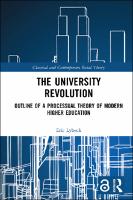The University Revolution
Proposal review
Outline of a Processual Theory of Modern Higher Education
Author(s)
Lybeck, Eric
Collection
Knowledge Unlatched (KU)Language
EnglishAbstract
Few institutions in modern society are as significant as universities, yet our historical and sociological understanding of the role of higher education has not been substantially updated for decades. By revisiting the emergence and transformation of higher education since 1800 using a novel processual approach, this book recognizes these developments as having been as central to constituting the modern world as the industrial and democratic revolutions. This new interpretation of the role of universities in contemporary society promises to re-orient our understanding of the importance of higher education in the past and future development of modern societies. It will therefore appeal to scholars of social science and history with interests in social history and social change, education, the professions and inequalities.
Keywords
academisation; academisation process; academization; academization process; aristocracy; children; clergy; division; Eric Lybeck; Eric Royal Lybeck; education; elites; elite institutions; emergence; higher education; history; inequality; mass university sector; middle classes; new inequalities; role; social science; sociology; transformation; two-phases; universities; womenDOI
10.4324/9781351017558ISBN
9781351017541, 9781351017558, 9781138497900, 9781032020327, 9781351017541Publisher
Taylor & FrancisPublisher website
https://taylorandfrancis.com/Publication date and place
2021Grantor
Imprint
RoutledgeSeries
Classical and Contemporary Social Theory,Classification
Society & culture: general
Sociology
Society and culture: general
Sociology


 Download
Download